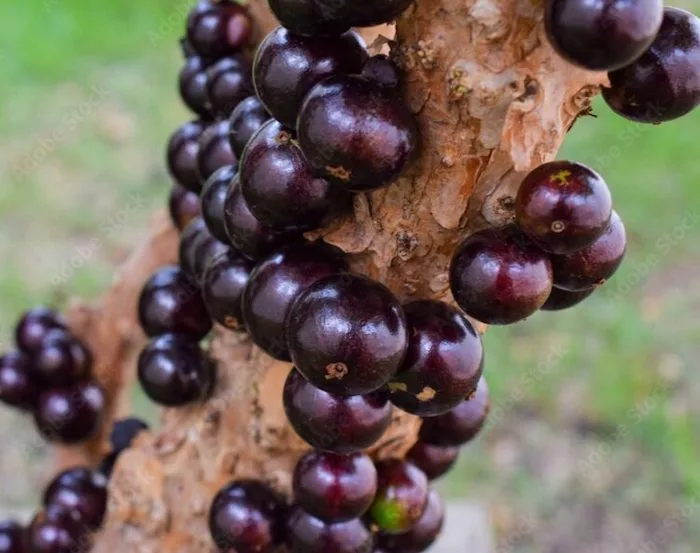Table of contents
Jaboticaba Tree Care
The jaboticaba tree (Myrciaria cauliflora) is a slow growing ornamental tree. This tree is famous for the purplish-black fruits that grow directly on the trunk. It originates from South America, being native to Brazil, Bolivia, Paraguay and north east Argentina.
Today there are many varieties of jaboticaba. However the most frequently grown varieties are Sabara, Paulista, Rajada, Branca, Ponhema and Rujada.
This tree can bloom intermittently throughout the year. However, the main flowering is usually in spring and the best fruit harvest is October/November.
Jaboticaba Tree Height
The tree can grow up to 12m (39ft) in height. However, pruning can make it work in your garden. It can even be pruned into a hedge.
Jaboticaba Tree Care
Jaboticaba tree care increases the chance this striking tree will produce purplish-black, white-pulped fruits, growing directly on the trunk.
Growing Jaboticaba from Cuttings
While jaboticaba trees are mostly propagated from seeds, grafting, root cuttings and air layering are successful as well.
Time needed: 3 minutes
How to Grow Jaboticaba from seed.
- Scoop out seeds and soak them.
Scoop out the seeds and soak them in a bowl of water for a day. Stir a few times to separate the seeds from the pulp.
- Rinse seeds
Rinse using a strainer to remove remaining pulp from seeds (you may have to do this a few times).
- Sow Seeds
Sow 3 or 4 jaboticaba seeds in each pot. Space the seeds 3cm (1.2in) apart on the surface of the potting mix. Press seeds onto the potting mix and cover them with a 3cm (1.2in) layer of sand.
- Water and Wait
Water in with a misty spray. Then water regularly and leave pot in partial sun.
- Germination
Germination should occur after about a month.
- Thin out
If more than one of your seeds has germinated, thin them out, leaving the strongest.
- Transplant
After another month or two transplant in to a full sun location. We like to do this after the first downpour of the wet season.
- Wait … and wait more
The tree is often grown from seed. However, it is slow growing and may take 6-8 years from seed to when it starts fruiting.
Jaboticaba Tree Australia
Jaboticaba grows well from latitude 32 to 16 degrees south. Furthermore you can find it at up to 1000m (3280ft) above sea level. It prefers mean annual temperatures of 22-26°C (72-79F), but will survive cooler temperatures.
The tree is fine for a suburban garden. Heavy rain can cause it to shed leaves, but it will survive periods of water-logging. This is important during the tropical wet season.
Best Fertiliser for Jaboticaba
Jaboticaba tree care includes feeding your tree. We fertilise our tree twice each year. Once pre-flowering and once as harvesting draws to a conclusion.
Pre Harvest we apply calcium and boron to promote flowering and pollination. Kelp also contains compounds to enhance flowering and fruit set.
Harvest/Post Harvest, we apply a fertiliser rich in nitrogen, phosphorus, potassium and calcium.
Jaboticaba can easily be grown in a pot. Indeed this is most beneficial if you live in areas where it might get too cold. It is also useful to grow in a pot if you don’t have the healthiest of soils or enough room in your garden.
Watering
This tree has a fairly shallow root system. It will require watering regularly during the ‘dry season’.
Pests and Diseases
This tree is very resistant to pests due to the leathery skin of the fruit. This protects it from insects. However, when the tree does fruit, you may have some competition from the nearby bird population.
Jaboticaba Tree Fruit
The end result of good jaboticaba tree care is fruit! Indeed the fruit is often eaten straight off the tree. However, it is also often used for making jelly, jams and marmalade.
Taste can vary a little with the variety. For example the red jaboticaba tastes like blueberry yogurt. White jaboticabas taste like sour lychees, and Grimal jaboticabas taste like a sweet grape candy. There are many other varieties. However, one thing they all seem to have in common is that they are bursting with tropical flavour.
The tree mainly fruits in autumn. However, with good jaboticaba tree care they can have multiple fruiting times throughout the year (especially when trees are well fed and watered).

Jaboticaba Tree Benefits
Weight Loss
The fruit is a healthy snack that can help with weight loss. It is low in calories and carbohydrates but packed with vitamins, minerals and protein. Therefore it has a good weight loss combination.
Fibre
The fruit is very high in fibre, with 0.08 milligrams of fibre per 100 edible grams. Consequently, this fibre helps to increase the absorption of water in the intestine facilitating the formation and elimination of stools.
Immune System
The fruit is high in zinc, an essential mineral in the production of defence cells of the body. As a result, the consumption of jaboticaba helps strengthen the immune system.
Antioxidants
Jaboticaba are rich in antioxidants. It contains antioxidants such as anthocyanins, which are known to combat free radicals, helping to avoid the deterioration of cells.
Prebiotics
Furthermore, research has shown the jaboticaba peel is a nutritious source of bioactive compounds with prebiotic effects. So in ordinary language, the peel is great for your gut health and can help to prevent disease.
Thank you for reading and all the best with your jaboticaba tree care.
Jaboticaba Tree for Sale
Consider visiting a local plant nursery. You will be surprised with what they have to offer. In the tropics, there is a good chance they will have a jaboticaba tree.
Jaboticaba Tree Bunnings
This plant is occasionally sold at Bunnings. You may find one in a small pot in the nursery section.
Other Tropical Fruits
- Black Sapote
- Custard Apple
- Dragon Fruit
- Guava Tree
- Grumichama
- Kumquat Tree
- Mamey Sapote
- Mulberries
- Natal Plum
- Passion Fruit
- Paw Paw
- Rambutan
- Star Apple
- Watermelon


Comments
3 responses to “Jaboticaba Tree Care Guide 2025”
[…] Jaboticaba […]
[…] Jaboticaba […]
[…] Jaboticaba […]